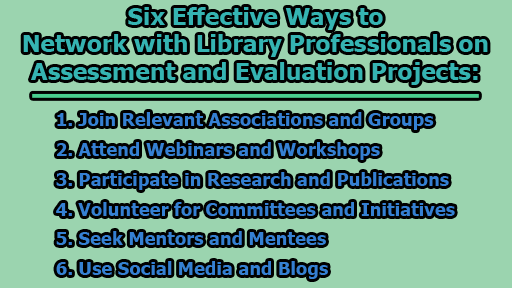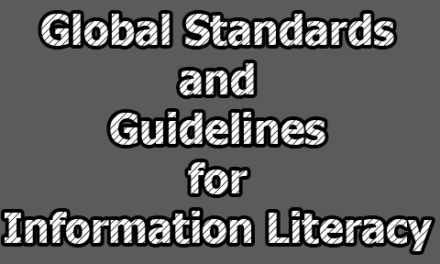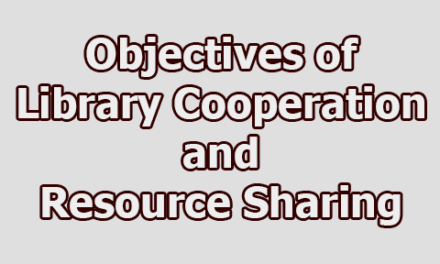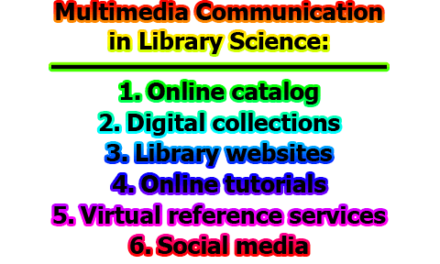Six Effective Ways to Network with Library Professionals on Assessment and Evaluation Projects:
The field of library assessment and evaluation is an ever-evolving landscape where professionals seek to enhance the effectiveness of libraries and information services. Networking with other library professionals who share similar interests is crucial for gaining insights, sharing experiences, and collaborating on assessment and evaluation projects. In this article, we will explore six effective ways to network with library professionals on assessment and evaluation projects.

1. Join Relevant Associations and Groups: One of the most accessible and effective ways to network with library professionals interested in assessment and evaluation projects is by joining relevant associations and groups. Two prominent organizations in this regard are the Association of Library and Information Science Education (ALISE) and the Library Assessment Conference (LAC). These associations offer various opportunities to connect, learn, and grow in your area of interest. You can attend conferences, workshops, and meetings, gaining access to valuable resources and a platform for networking.
Online groups and forums are another essential resource for networking. The Library Assessment Interest Group (LAIG) and the Library Assessment Community of Practice (LACoP) are notable examples. These online communities enable members to ask questions, share insights, and receive feedback from peers who are equally passionate about assessment and evaluation.
2. Attend Webinars and Workshops: Participating in webinars and workshops focused on assessment and evaluation projects is an excellent way to expand your knowledge and network with professionals in the field. Many organizations, including the Association of Research Libraries (ARL), the American Library Association (ALA), and the Library Leadership and Management Association (LLAMA), offer such educational opportunities.
In addition to attending these events, take the initiative to engage with presenters and fellow attendees. Networking can be as simple as following up with a thoughtful email, exchanging contact information, or connecting on social media platforms.
3. Participate in Research and Publications: Contributing to research and publications can help you establish your expertise in library assessment and evaluation. Look for calls for proposals, papers, or chapters from journals, books, or conferences that focus on these topics. Collaborating with peers and co-authors allows you to build your reputation, expand your network, and learn from others in the field.
4. Volunteer for Committees and Initiatives: Volunteering for committees and initiatives related to library assessment and evaluation is another excellent way to network. By actively participating in such groups, you gain practical experience, contribute to meaningful projects, and connect with like-minded professionals. These opportunities may be available within your own library or organization, or you can explore external committees and initiatives organized by professional associations or agencies.
For instance, you can join committees like the ALA Committee on Accreditation or become a member of the Institute of Museum and Library Services (IMLS) Grant Review Panel. These engagements will help you expand your network and influence in the field.
5. Seek Mentors and Mentees: Building relationships with mentors and mentees is a valuable aspect of professional networking. Mentorship programs like the ALISE Mentorship Program and the LAC Mentorship Program can match you with compatible partners who can provide guidance and support. Informal mentorship relationships can also be established by reaching out to respected professionals or offering assistance to newcomers in the field.
Mentorship provides an opportunity to learn from others, share experiences, and receive constructive feedback, ultimately strengthening your skills in library assessment and evaluation.
6. Use Social Media and Blogs: In the digital age, social media and blogs play a pivotal role in networking. Platforms such as Twitter, LinkedIn, and Facebook offer the chance to follow, connect, and interact with other librarians interested in assessment and evaluation projects. You can join relevant discussions, share information, and stay updated on industry trends.
Furthermore, blogs like the ARL Assessment Blog and the Library Journal Assessment Blog offer valuable insights and a platform for contributing to discussions about library assessment and evaluation.
In conclusion, networking with library professionals in assessment and evaluation projects is an essential part of professional growth and development. By joining associations, attending events, participating in research, volunteering, seeking mentors and mentees, and engaging with social media and blogs, you can expand your network and collaborate with like-minded individuals. These connections will not only help you stay up-to-date with the latest trends but also provide a platform for sharing your expertise and contributing to the ever-evolving field of library assessment and evaluation.

Library Lecturer at Nurul Amin Degree College









